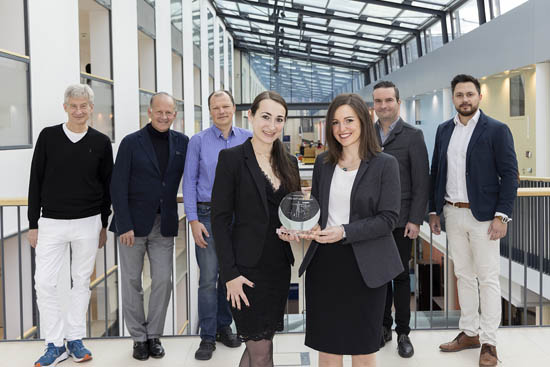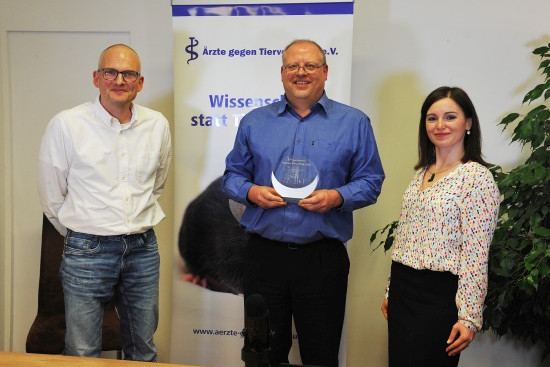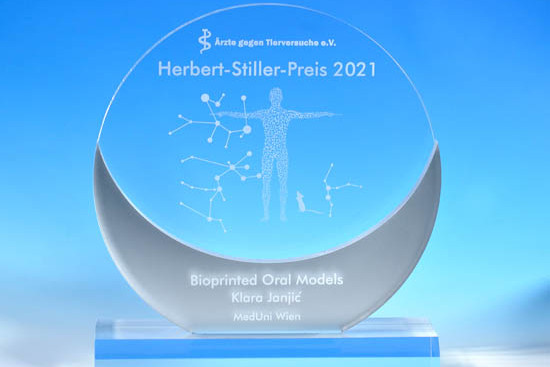Herbert Stiller Research Grant 2021
The Herbert Stiller Research Grant has been awarded by Doctors Against Animal Experiments (DAAE) at irregular intervals since 1995. After a long interruption in the 2000s, earmarked sponsorship funds have made it possible to relaunch the prize in 2019. In 2021, this distinguished research grant was awarded for the second time. The grant amounts to 2 x € 20,000.
The prize aims to promote innovative scientific work in the field of animal-free, human-based research that makes a significant contribution to medical progress.
The prize is named after one of the DAAE’s co-founders, Dr Herbert Stiller (1923-1984), a specialist in neurology, psychiatry and psychotherapy.
Application criteria
Unlike the awards in the 1990s/2000s, the 2021 prize is not presented retrospectively for past research, but rather provides funding for planned research projects in the field of medicine and life sciences with a research location in Germany and other German-speaking countries. The projects may contain neither animal experiments nor animal-derived materials (e.g. FCS or animal antibodies). The planned research can include in vitro studies, in silico analyses or even clinical or epidemiological studies. The projects should investigate a new, innovative topic or establish a new methodological approach. Applicants must identify with the principles and goals of Doctors Against Animal Experiments.
The winners 2021
The DAAE jury, consisting of the scientific staff of the organisation and three external scientists, selected the two prizewinners from numerous applications. Selecting the winners was not an easy task, because we received many applications from four countries and various scientific fields such as cancer research, neurology and infectious dieseases, all of which were eligible and had the potential to prevent great animal suffering.
Dr Klara Janjic, Medical University of Vienna

From left: Univ. Prof. DDr Andreas Moritz, Head of the University Clinic of Dentistry Vienna at the Medical University of Vienna, Award winner Dr Klara Janjić, Dr Dilyana Filipova, scientific officer at Doctors Against Animal Experiments, and Dr Andreas Ganz, board member at Doctors Against Animal Experiments
Photo credit: MedUni Wien / feelimage
Title: Establishment of bioprinted human oral disease models for in vitro testing (Etablierung biogedruckter humaner oraler Krankheitsmodelle für In-vitro-Tests)
Summary: A large part of the world’s population suffers from oral diseases such as periodontitis, oral dysplasia and oral lichen planus, which often coincide with other systemic diseases. In such cases, possible interactions between the diseases as well as treatment cross-reactions have not yet been elucidated and require an appropriate test model to investigate the reactions and mechanisms involved. Currently, research into these questions is mostly based on simple 2D cell models that do not sufficiently reflect the complex properties of human 3D tissues, and on very cruel animal experiments, e.g. with dogs and rabbits, which show species-specific anatomical, histological and physiological features and do not replicate the processes of the human oral mucosa.
In this project, a three-dimensional personalized model of the healthy and diseased human oral mucosa will be developed using 3D bioprinting. Human cells, oral tissue and saliva will be isolated from healthy individuals and patients with various oral diseases. Software analysis of the patient's tissue will be carried out, digital 3D models of the healthy and diseased human oral mucosa will be created and bioprinted. These models will be used to test different dental materials and to study possible treatments for periodontitis and other oral diseases. The patient's own cells are used for the models, so the local reactions to different materials and therapeutically applied substances can be analyzed in a patient-specific manner. In addition, the tissue architecture of the bioprinted models will be compared with the structure of the corresponding patient tissue to reflect the patient's condition as accurately as possible. Thus, the results of this project promise a significant improvement in personalized oral medicine and are highly relevant for animal welfare.
Dr Wolfgang Boomgaarden, PharmaInformatic, Emden
Title: Are animal studies on oral bioavailability transferable to humans? An overall analysis of all previously conducted and available results from clinical studies in humans and preclinical animal experiments in dogs, rats, monkeys and mice.
Summary: The absorption of an orally taken drug into the human body (oral bioavailability) is one of the most important pharmacokinetic properties in the development of new drugs. If a new drug does not have oral bioavailability, it cannot exert a pharmacological effect in humans because it does not enter the systemic bloodstream. The oral bioavailability is routinely determined in the course of drug development by animal experiments in monkeys, dogs, rats and mice in order to estimate the pharmacological profile in humans. Since animal and human values often differ greatly from each other, many drugs fail in human clinical trials due to insufficient bioavailability. On the other hand, drugs that are effective for humans can be incorrectly sorted out early in the development process because they have a lower bioavailability in the used animal species.
In this project, the transferability of animal experimental data to humans will be examined by comparing the oral bioavailability of approximately 150 drugs using computer-aided analyzes of human and animal data. The award winner, Dr Boomgaarden from the bioinformatics company PharmaInformatic, Emden, has developed computer-assisted expert systems with artificial intelligence (AI) that use the chemical structure of drug candidates to predict their bioavailability. Existing and published data from animal experiments and the corresponding values from clinical studies with humans will be used for the planned project. The difference in oral bioavailability between humans and animals for 150 selected drugs will be calculated after evaluating all available studies and the average error will be determined. Previous analyses show that in some cases very large differences between the values in humans and animals are to be expected. The results should be an incentive for pharmaceutical companies to use these expert systems instead of the usual animal tests in order to calculate the effectiveness of their drug candidates faster and more accurately.
The award ceremonies
Award ceremony on 08.11.2021 in Vienna
The first award ceremony took place on November 8, 2021, at the University Clinic of Dentistry Vienna of the Medical University of Vienna. Dr Dilyana Filipova, scientific officer at DAAE and Dr Andreas Ganz, DAAE’s board member, emphasized the innovative power of the project in their laudatory speech. “In the field of dentistry and oral medicine, there are only a few human-relevant models. In addition, very cruel animal experiments, with dogs and rabbits, for example, are carried out for these purposes. That is why we are particularly pleased to support this robust project," says Filipova.

Award winner Dr Klara Janjić (left) with DAAE’s scientist Dr Dilyana Filipova, a university delegation and DAAE’s board member Dr Andreas Ganz (2nd from right.)
Photo credit: MedUni Wien / feelimage
Award ceremony on 29.11.2021 in Cologne
The award ceremony took place at the DAAE’s headquarters in Cologne and was broadcasted live on YouTube. Dr Boomgaarden presented his highly relevant, modern, ambitious project in which the oral bioavailability of around 150 substances will be analyzed in humans using the award winner's expert systems and compared with existing data of the corresponding values in different animal species.

From left: DAAE’s CEO Claus Kronaus, award winner Dr Wolfgang Boomgaarden and Dr Dilyana Filipova, a scientist at DAAE.
Photo credit: Foto Stephan Behrla/Nöhrbaß GbR
The sponsors
Special thanks go to the two sponsors, Sabine Herrmann and Florian Buchner, without whose generous earmarked donations this funding of innovative research would not be possible. It is also thanks to Florian Buchner that the Herbert Stiller Research Grant was relaunched in 2019 after a long break. We thank both sponsors for their important contribution to cruelty-free and highly efficient research and medicine.

